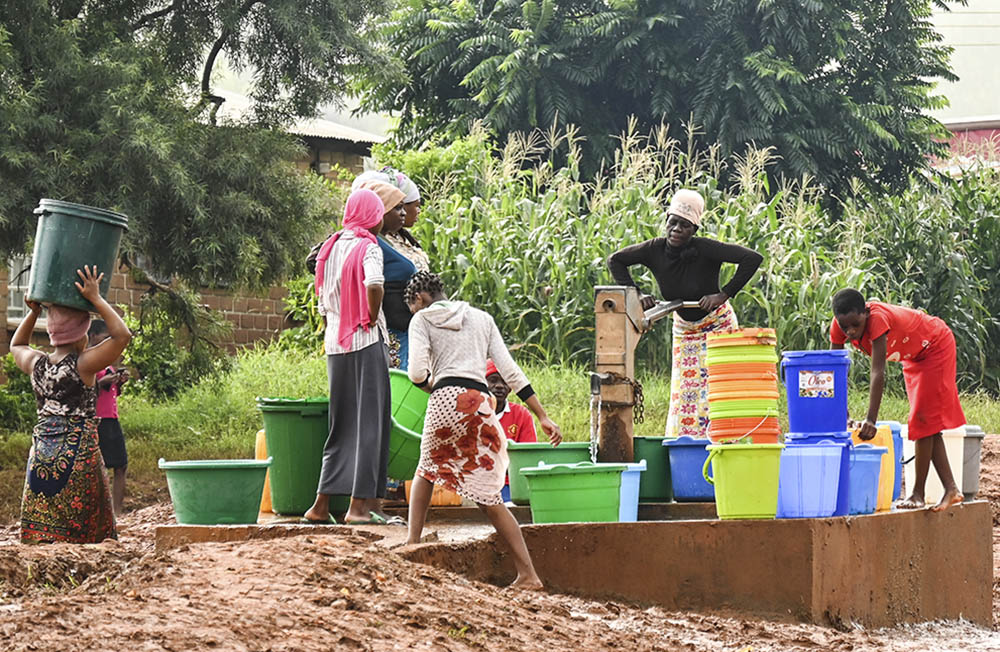
Women collect water in Blantyre, southern Malawi, March 17. (AP/Thoko Chikondi)
For three days last week, the United Nations took a needed look at that most fundamental of resources: water.
The 2023 U.N Water Conference, held March 22–24, brought together governments, states, businesses, scientists, environmentalists and civil society groups like sister congregations to find common ground in advancing what U.N. leaders called "the water action agenda."
For activists like Blair Nelsen and Srs. Rose Therese Nolta, Carol De Angelo and Veronica Brand, it was a welcome moment of international recognition affirming the growing global consensus on protecting water resources.
That is something the U.N. has declared a necessity in its sustainable development goal of reaching "universal access to drinking water, sanitation and hygiene by 2030."
Faith traditions have long recognized that "water is sacred and the source of life," said Nelsen, the lay representative at the U.N. for the Congregation of the Sisters of St. Joseph of Peace and executive director of the New Jersey-based Waterspirit, a spiritual ecology nonprofit.
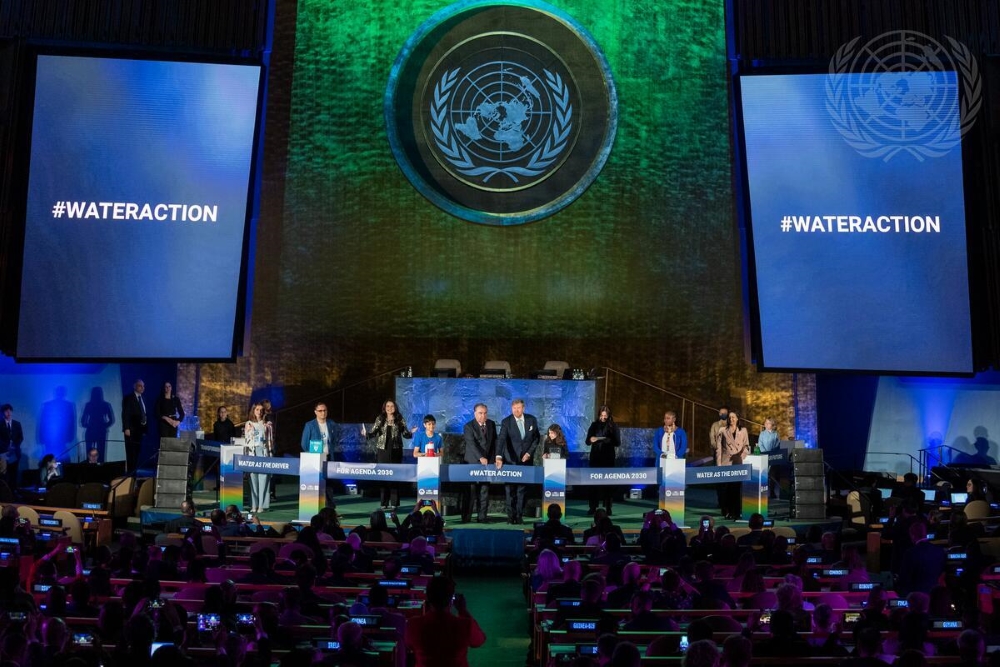
The opening ceremony of the U.N. 2023 Water Conference takes place at the U.N. General Assembly in New York. (UN/Rick Bajornas)
But with the imprimatur of the U.N., the issue now has an added "moral mandate," Nelsen said — one that gives a boost to activists and also allows them to hold U.N-member states accountable for their declarations.
Nelsen said the importance of such U.N. conferences is to promote "a global ethics project."
The event drew some 10,000 participants, both attending in person at U.N. headquarters in New York and online, allowing for fact-sharing, debate and networking across different groups, nations and time zones.
Csaba Korosi, the president of the U.N. General Assembly, said that $300 billion in pledges were made during the conference.
Organizers said at least 700 commitments were made as a result of the conference. Among governments, the United States said it would commit up to $49 billion in investments "to support climate resilient water and sanitation infrastructure and services," while Japan said it would provide up to $3.65 billion to improve water infrastructure in the Asia-Pacific region over the next five years.
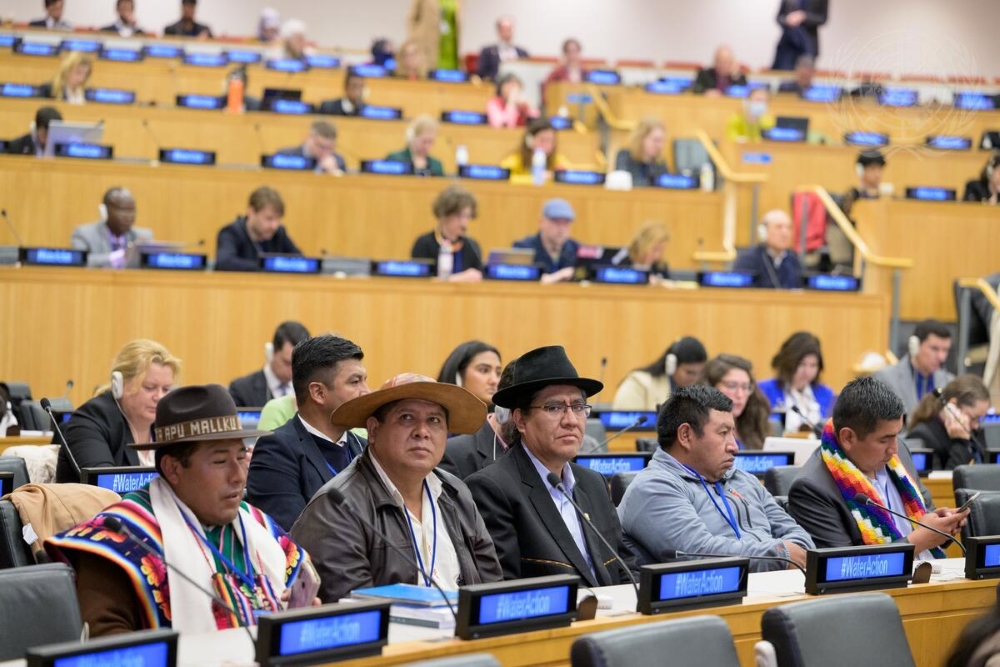
The delegation from Bolivia attends the special event on “Reducing Inequalities — Implementing Human Rights” during the U.N. 2023 Water Conference in New York. (UN/Manuel Elías)
In an interview, Brand, a Sacred Heart of Mary sister who represents her congregation at the U.N., said the concrete promises were encouraging, as they give activists and others hope for "concrete outcomes rather than vague promises."
She also noted that the conference showed that there is now a global consensus on such issues as the universal right to water — something that was not always a given when the U.N. debated the issue in 2010 and when it ultimately declared that access to water is a fundamental human right.
"Now there is not an argument about that," Brand said, noting that it is now accepted "that it's in the interest of all of humanity to take action for the sake of the planet."
In remarks at the conclusion of the three-day event, U.N. Secretary-General António Guterres hailed the conference and the commitments made, praising participants for an "ambitious vision and dedication to action and transformation [that] is propelling us towards a sustainable, equitable and inclusive water-secure future for people and planet alike."
Advertisement
Guterres added: "As humanity's most precious global common good, water unites us all. And it flows across a number of global challenges. Water is about health, sanitation, hygiene and disease prevention. Water is about peace. Water is about sustainable development, fighting poverty, supporting food systems and creating jobs and prosperity. Water is about human rights and gender equality."
That is why, Guterres said, "water needs to be at the center of the global political agenda."
Nolta, the justice and peace coordinator of the Holy Spirit Missionary Sisters, noted that while the conference did not produce a legally binding document or treaty, its "outcome document did have a number of water actions and commitments."
The conference's value, she told EarthBeat, "was an ever-growing awareness and hopefully commitments in going forward with the water agenda."
In a March 24 webinar, Nelsen urged participants to demand that governments take the right to water and sanitation seriously.
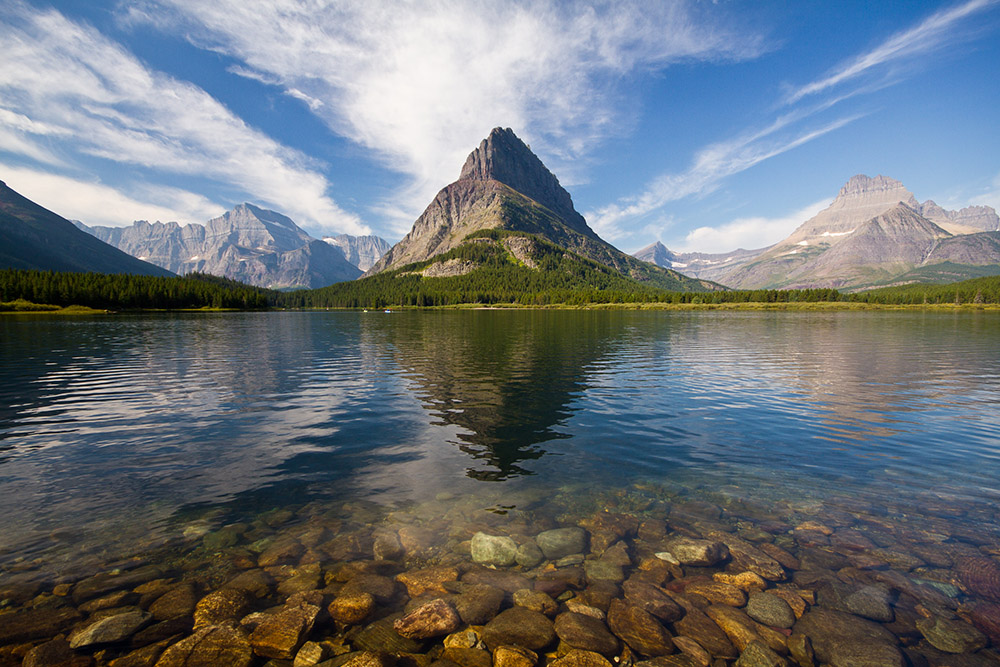
Swiftcurrent Lake is seen in Glacier National Park, Montana. The state of Montana is one of three in the United States that have passed "green amendments" protecting the right to a healthy environment, including water. (Wikimedia Commons/GPA Photo Archive)
So far, only the states of Pennsylvania, Montana and New York have passed state-level "green amendments," which Nelsen explained "are constitutional amendments that protect our rights to clean air, clean water and healthy environments for this and future generations." They are similar to actions taken by several U.N. bodies, including a resolution by the U.N. General Assembly last year declaring that it is a universal human right to have access to a clean, healthy and sustainable environment.
"Every U.S. state that passes a green amendment comes closer to enacting these high-level U.N. commitments on the ground," she said.
The difference on the ground is important. "Access to safe water, sanitation and hygiene is the most basic human need for health and well-being, and a declared human right," the U.N. said, noting the 2010 U.N. affirmation of access to water as a basic human right. "But some 2 billion people around the world still lack access to safe drinking water and 40 per cent of the world's population are affected by water scarcity."
Two areas affected by water-related challenges are Peru and the Palestinian territories.
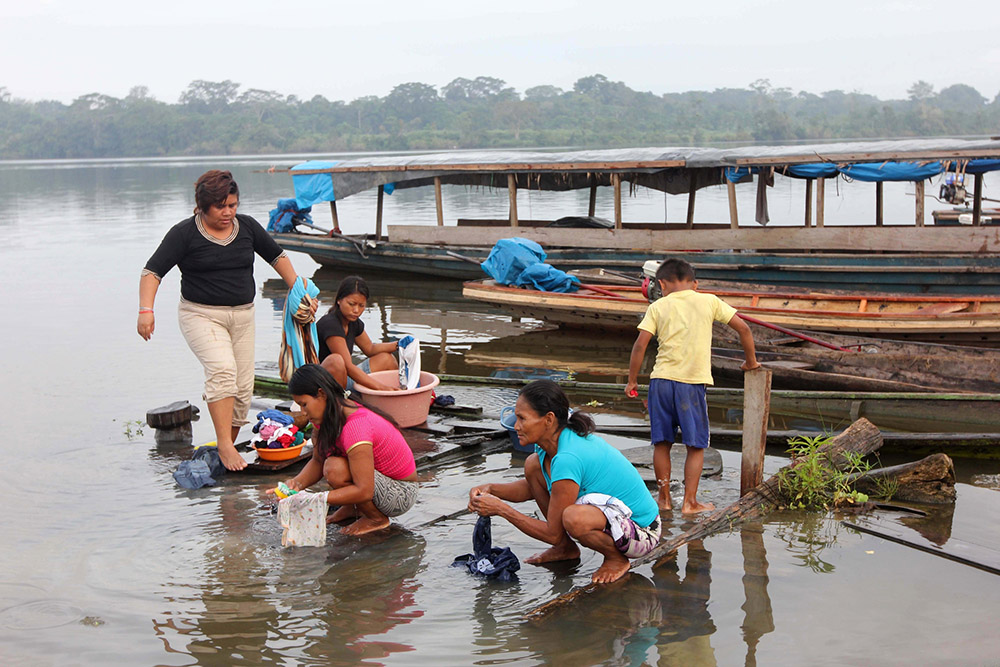
Residents of Dos de Mayo, Peru, wash their clothes in a lake in 2014. Water, soil and sediments in the Amazon tributary contain heavy metals and other residue from more than four decades of oil production. (CNS/Barbara Fraser)
During a March 23 webinar that Nelsen moderated, Laura Ramírez Chávez, with Caritas Madre de Dios in Peru, noted the ongoing problems that extractive industries such as mining and deforestation are having on economically impoverished communities in Peru — communities that are left to feel "invisible" because governments permit such industries to have almost carte blanche in rural areas.
By contrast, access to clean water is a needed lifeline. "Water is a source of hope," she said.
Meanwhile, in the occupied territories, Palestinians are living on top of many water reserves but have little access to them because of restrictive Israeli government policies, said Susan Power, head of legal research and advocacy for Al-Haq, a Palestinian human rights advocacy group.
Current policies and practices "enable the Israeli military authorities to hold complete control over all water resources and water-related infrastructure in the Occupied Palestinian Territory," the group said in a December 2022 report.
The result, Power said, is that Israeli settlers have an abundance of water — even having access to swimming pools — while many Palestinians often have less than 50 liters of available water a day. (A U.N. report in 2021 made a similar conclusion, as reported by The Jerusalem Post.)
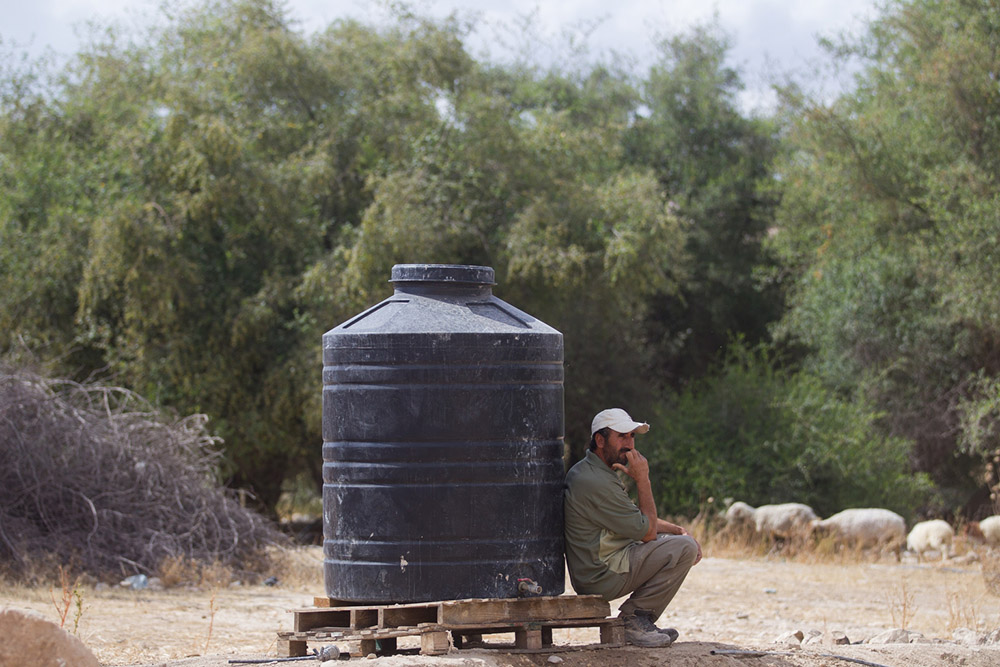
A Palestinian man leans up against a water tank in Fasayel, West Bank. (CNS/Miriam Alster)
Other concerns animated the water conference, noted De Angelo, director of the Office of Peace, Justice and Integrity of Creation for the Sisters of Charity of New York, and a longtime activist on concerns related to the environment, particularly with the Hudson River.
These include toxins in water supplies and issues of environmental injustice for economically and racially marginalized communities, and a growing sense among environmentalists that the ecosystems should be entitled to legally binding rights.
With Pope Francis' 2015 encyclical, "Laudato Si', on Care for Our Common Home," as a foundation, it is not surprising, she said, that Catholic activists — such as the Metro New York Catholic Climate Movement — are gaining visibility, prominence and acceptance within the church. Nor was it a surprise that Catholic groups like Franciscans International and Caritas were represented at the U.N. conference.
Catholic humanitarian groups, of course, are heavily involved in water-related work. The first day of the U.N. conference, March 22, was international World Water Day, a day marked by Salesian Missions, the New York-based development arm of the Salesians of Don Bosco.
The Salesians have made clean water projects a priority because billions of people globally "don't have clean water for drinking, cooking, sanitation and other needs," said Fr. Timothy Ploch, interim director of Salesian Missions. He said a Salesian clean water initiative has made "building wells and supplying fresh, clean water a top priority for every community in every country in which Salesian missionaries work."
Among the countries where the Salesians are working on water are Mozambique, Namibia, Zambia and Vietnam. That speaks of the global reach of water challenges, advocates note.
"Water issues are critical because water is life, water is sacred," De Angelo said. "This touches on our relationship with God, with prayer."
Nolta said that for sister congregations working as part of the wider church, including working collaboratively with other congregations, there is a common multifaceted approach "of awareness and education, prayer, advocacy and actions."
With the U.N. affirmation of water action, she said, "Now it is up to each one of us, each community and each government, to act to make a difference in our world."
Nelsen noted that it had been nearly 50 years since the U.N. formally took up the theme of water — the first U.N. conference on water was held in Mar de Plata, Argentina, in 1977.
When asked if three days amounted to sufficient time for such an important topic, Nelsen said, "Three days is better than another 46 years of silence."








